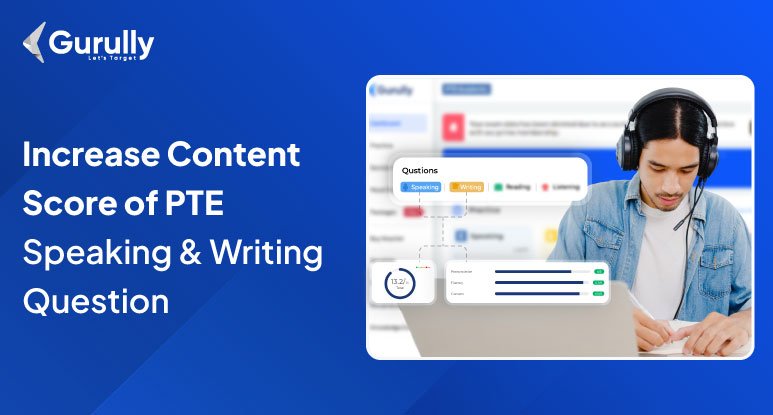Your responses in the PTE speaking and writing sections are evaluated on various skills. Out of those skills, ‘Content’ plays an important role. Content is evaluated in ‘Read Aloud, Repeat Sentence, Describe Image, Re-tell Lecture, Answer Short Question, Summarise Written Text, Essay, Write an Email’- question types. So, even the slightest mistake can reduce your entire marks. But worry not, here is a guide that will help you score high and achieve your target score.
Read what changes are required at different score levels—so you know exactly what’s keeping you away from your target score.
Why “Content” Matters in PTE
Content skill in PTE speaking and writing section refers to how well you are able to capture the core message or structure in the task. While giving a response, you have to make sure that you are not missing any information and responding exactly what I asked in the question. Always remember your content score suffers, even if the rest of your performance seems fine.
Across tasks, Pearson’s scoring rubric is quite clear: every omission, insertion, or replacement of a word or idea counts as an error. This is especially true for Read Aloud and Repeat Sentence, where content is strictly based on accurate reproduction.
Strategy for Improving Content Score:
Here’s a breakdown of how to interpret your content performance based on your score range and what you need to do to boost it.
Scoring Below 50? Focus on Basics
If you’re consistently scoring below 50 in Speaking or Writing, chances are you’re:
- Missing key parts of the prompt
- Paraphrasing too much or going off-topic
- Including memorized or unrelated material
What You Should Do:
- Follow the prompt and do not try to add any additional information which is far from the question’s desired input.
- Avoid inserting pre-learned content. Especially in Describe Image or Essay Writing, content taken from templates rarely aligns well with the actual task.
- Practice listening carefully. In Repeat Sentence and Summarize Spoken Text, losing words or structure drops your content score dramatically.
Start your free PTE mock test with Gurully and get AI-powered analysis for a personalized journey.

- Kickstart your PTE prep with a free AI-scored mock test
- Boost your score with in-depth analysis & smart recommendations
Scoring 50–60? Eliminate Minor Misses
This is a tricky range. You’re doing okay, but not quite well. If you’re in this band, you’re likely:
- Capturing some—but not all—key elements
- Missing 1–2 relevant aspects in summarizing tasks
- Substituting words that slightly alter the meaning
What You Should Do:
- Improve precision. Don’t just aim for a general idea—match specific elements from the prompt.
- Review your output. In Essay and Summarize tasks, re-read to ensure you’ve touched on every major point.
- Stay focused. Many drop content marks by wandering into unrelated territory. Always align with the central theme.
Scoring 60–70? Bridge the Gap with Structure
You’re getting most things right, but your answers may still lack completeness or full clarity. You may:
- Cover major elements, but not their relationships
- Miss implications or conclusions, especially in Describe Image or Essay
- Include 50–80% of correct words in Repeat Sentence
What You Should Do:
- Link ideas effectively. In image descriptions and summaries, show how elements relate or develop over time.
- Aim for full coverage. Don’t just list ideas—bring them together to show understanding of the big picture.
- Retain original sequencing. Especially in Repeat Sentence, train yourself to recall the order of words more accurately.
Scoring 70+? Maintain Accuracy Under Pressure
If you are scoring 70+, you’re doing well, try to keep this score constant and take care of these common issues like:
- Minor omissions in long texts
- Slightly incorrect phrasing under time stress
- Over-condensing in summarizing tasks
What You Should Do:
- Practice on Mock tests. This helps you maintain complete responses even under pressure.
- Review each sentence’s purpose. In written tasks, ensure that every sentence adds value and remains relevant to the core prompt.
- Resist rushing. Even small omissions can break your 70+ streak.
Summarisation:
| Score Band | Common Issues | Key Focus Areas | What to Improve for Next Band |
| Below 50 | – Missing key ideas
– Off-topic answers – Memorized templates – Poor memory in Repeat Sentence |
– Understand the task
– Stay on-topic – Identify main ideas |
– Avoid templates/fillers
– Work on listening memory – Follow the prompt’s structure
|
| 50-59 |
– Missing 1–2 points – Slightly rewording content – Superficial summaries |
– Capture important points – Use similar wording/structure – Express thoughts clearly |
– Make responses more complete
– Don’t change the core meaning – Align better with the prompt |
| 60-69 | – Partial idea coverage
– Poor connections between points – Weak conclusions |
– Build logical links
– Include all key ideas – Improve Repeat Sentence sequencing |
– Link ideas effectively
– Make conclusions relevant – Practice memory and sequencing |
| 70+ | – Small details missed
– Speed affects quality – Not enough depth |
– Be consistent under pressure
– Focus on detail – Fully develop ideas |
– Keep all points intact
– Practice with timers – Avoid rushing and missing points |
You can boost your content score effectively by practicing on Gurully. It gives you clear insights into your mistakes and highlights areas that need improvement. Regular practice through PTE academic practice test and section-wise tests helps you stay focused and well-prepared. With instant AI scoring and detailed feedback, Gurully guides you towards achieving your target score in the real PTE exam.
Conclusion:
To score high in the “Content” skill of PTE Speaking and Writing, you must stay relevant, cover all key points, and avoid adding or missing information. Focus on understanding the task and improving accuracy with each response. Regular PTE practice on Gurully can help you identify mistakes, stay on track, and reach your target score faster with the help of smart feedback and mock tests.
FAQ:
How to score high in PTE Speaking?
How can I improve my PTE content?
How to get a good score in PTE Read Aloud?
How to get 79+ in PTE Writing?
How to summarize text in PTE?
Also Read:
- How to Take PTE Mock Test – Get Prepared In Advance For Real Exam
- Secrets To Score High In ‘Vocabulary’ Skill of PTE Exam
- PTE Pronunciation Score: What It Means and How You Can Improve It







